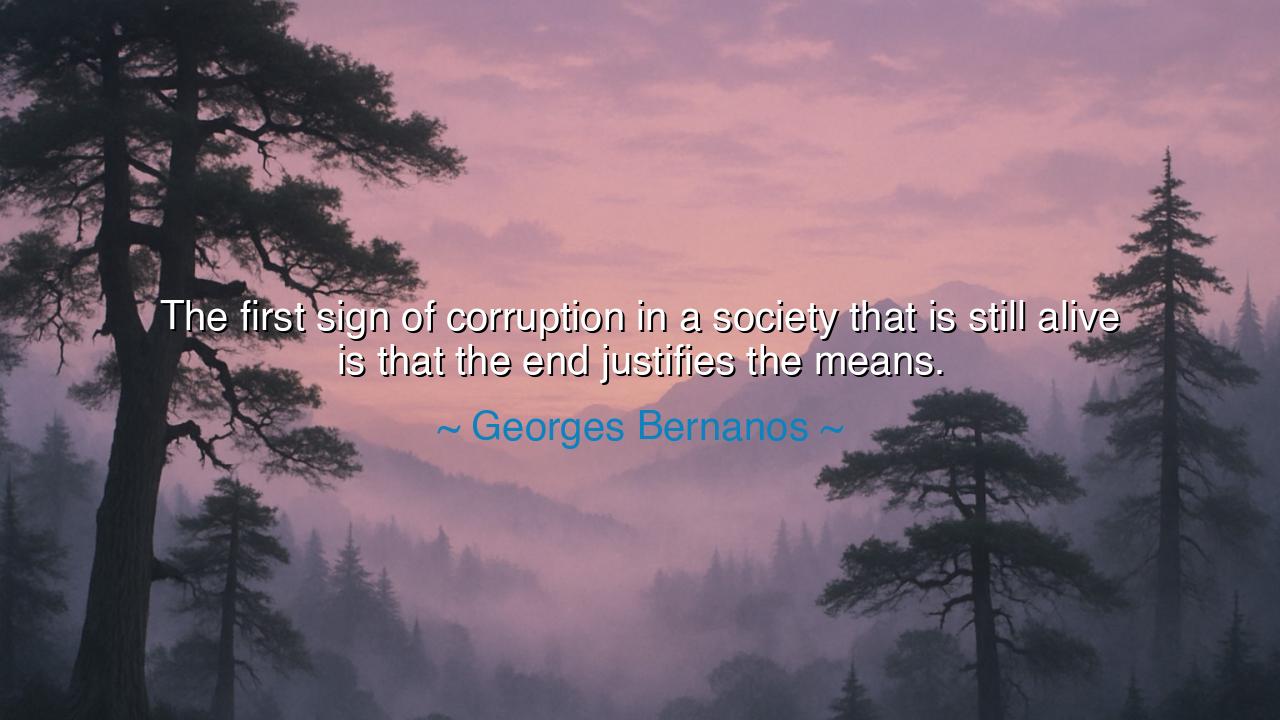
The first sign of corruption in a society that is still alive is
The first sign of corruption in a society that is still alive is that the end justifies the means.






O children of the future, listen carefully to the words of Georges Bernanos, a man whose understanding of the human spirit and society strikes deep: "The first sign of corruption in a society that is still alive is that the end justifies the means." In these words, Bernanos reveals a truth as ancient as human civilization itself—the moment a society begins to believe that the ends can justify the means, it marks the beginning of its corruption. The moral fabric of a society is the thread that holds it together, and once that fabric is frayed by the belief that any action is permissible for the sake of a goal, the society’s downfall begins.
In the time of the ancients, Socrates warned against the dangers of compromising virtue for expediency. He understood that the means we choose—the actions we take—are just as important as the ends we seek. The philosophers of old knew that justice was not simply about achieving a goal, but about maintaining integrity and wisdom in every step of the journey. Plato, in his Republic, argued that a just society must be governed by reason and virtue, not by the manipulation of ends to serve selfish desires. The ancients understood that a society that forsakes the means for the ends will find itself morally bankrupt, no matter how great its accomplishments may seem.
Look now to the great Roman Empire, which, at its height, was a beacon of power and influence. The emperors of Rome, especially Augustus, justified their actions—no matter how ruthless—by the supposed good they brought to the Empire. In their eyes, the peace and prosperity of the Empire (the end) justified any act, even cruelty and tyranny (the means). Yet, in the end, the Roman Empire, despite its wealth and power, collapsed not due to external forces, but because of the corruption at its core. The moral decay that came with justifying any action for the sake of power ultimately led to its downfall. The means they used to maintain control, rooted in deception and cruelty, ensured that the Empire's legacy was one of corruption.
The lesson from history is clear: when a society embraces the idea that the end justifies the means, it abandons its moral compass. We see this in the revolutions and wars of history, where entire nations were led to believe that their violence, oppression, and deceit were justified by a supposed greater good. The French Revolution, for instance, while birthed from the ideals of freedom and equality, soon degenerated into the Reign of Terror, where the violence against perceived enemies was justified in the name of justice. The revolutionaries believed that their actions, however cruel, were justified by the noble ends they sought to achieve. But in their pursuit of justice, they lost their very humanity, becoming the very thing they had sought to overthrow.
This belief—that the end justifies the means—is not a modern phenomenon; it has always existed when power and self-interest replace virtue and wisdom. Totalitarian regimes, whether in Nazi Germany or Stalinist Russia, were founded upon this same principle: the idea that the greater good (the creation of a perfect state, for example) justified the horrors inflicted upon those who stood in the way. Leaders of these regimes manipulated the people, convincing them that suffering was necessary for the greater good, and the ends they pursued justified the means of torture, execution, and betrayal. History has shown us, time and time again, that such thinking leads to moral collapse and societal destruction.
The moral corruption that Bernanos speaks of is not just a matter of political or historical consequence; it is a personal one as well. When we begin to justify our actions—our small lies, our cheating, or our manipulation of others—because the ends we seek seem noble or worthy, we lose our integrity. The means by which we live our lives, how we treat others, and how we navigate the world is the very foundation upon which our character is built. To believe that the end justifies the means is to say that moral compromise is acceptable, and in doing so, we pave the way for a life full of regret and corruption.
So, O children, remember the wisdom of Georges Bernanos and the ancient philosophers. Never allow yourself to fall into the trap of justifying wrong actions for a perceived greater good. True success, justice, and wisdom are built on integrity, and it is the means—the paths we choose to walk—that define who we are. A society that abandons the importance of the means will, like ancient empires, crumble under the weight of its own corruption. In your own lives, let virtue, honesty, and integrity guide your actions, no matter how great or small the end you seek. For in this, you will not only avoid the corruption of your soul, but you will help to build a world where justice and truth are the foundations upon which we stand.






AAdministratorAdministrator
Welcome, honored guests. Please leave a comment, we will respond soon